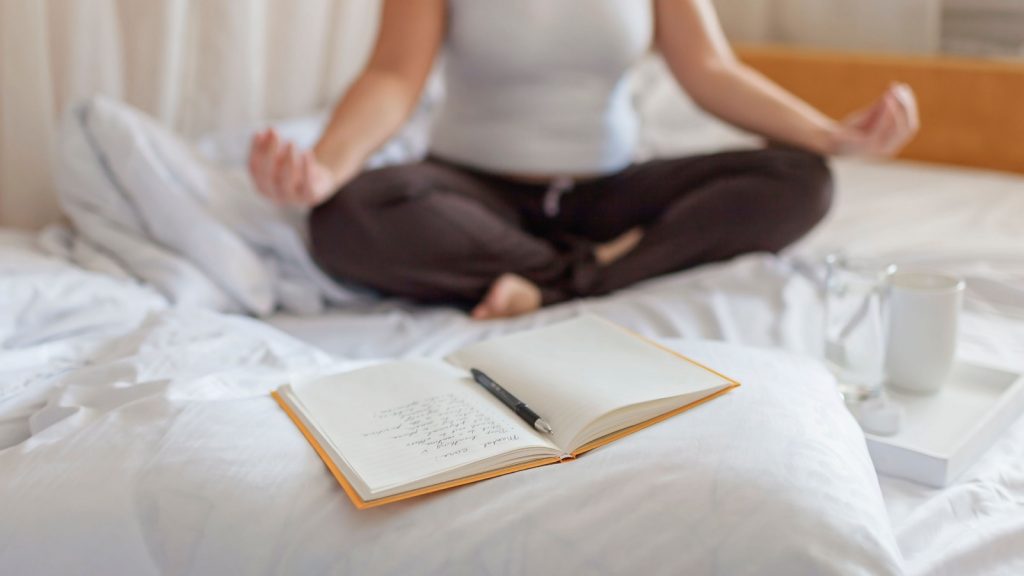Looking after your mental health doesn’t have to involve big, life-changing efforts. Small, consistent habits can make a huge difference to how you feel and cope with life’s ups and downs. Whether it’s carving out a few minutes to relax or doing something that sparks joy, these simple tips are easy to fit into even the busiest of days. The key is consistency—regular little actions add up over time to create lasting benefits. With these ideas, you can nurture your mental wellbeing while going about your daily life. Here are 15 ways to feel better, one small step at a time.
1. Go for a Walk in Nature

Spending time outside, especially in green spaces, can reduce stress and lift your mood. A quick walk in your local park or a stroll through your garden can work wonders. The combination of fresh air, natural light, and physical activity helps to clear your mind and boost endorphins. Aim for at least 20 minutes to really feel the benefits. Research shows that regular exposure to nature can also lower blood pressure and improve focus.
2. Drink Plenty of Water

Staying hydrated is one of the simplest ways to support your mental health. Even mild dehydration can leave you feeling sluggish or irritable. Keep a reusable water bottle handy as a reminder to drink regularly throughout the day. Adding a slice of lemon or cucumber can make it more refreshing if plain water isn’t your thing. Proper hydration also helps maintain energy levels and supports concentration.
3. Practise Gratitude

Taking a moment to focus on the good things in your life can help shift your perspective. Try jotting down three things you’re grateful for each day, no matter how small. It could be a kind word from a friend, a warm cup of tea, or even the sound of birds outside your window. Gratitude journaling can train your brain to notice and appreciate positives more often. Over time, this habit can help reduce symptoms of anxiety and depression.
4. Prioritise Sleep

Getting enough rest is essential for a healthy mind. Lack of sleep can heighten anxiety and make it harder to handle daily challenges. Set a regular bedtime and create a calming evening routine to wind down. Avoid screens for at least an hour before bed, as blue light can interfere with your body’s natural sleep cycle. Consistently sleeping 7–9 hours per night can also improve memory and emotional regulation.
5. Declutter Your Space

A tidy environment can help reduce feelings of stress and overwhelm. Start small by organising a single drawer or clearing off a cluttered surface. Creating a more ordered space can give you a sense of control and make it easier to focus. Plus, letting go of items you no longer need can feel surprisingly freeing. Studies show that a clean, organised space can also increase productivity and creativity.
6. Try Deep Breathing Exercises

Taking slow, deep breaths can help calm your mind and body when you’re feeling tense. Try inhaling for a count of four, holding for four, and exhaling for four. Even a minute or two of focused breathing can make a noticeable difference. It’s a handy technique to use anytime you feel stressed or overwhelmed. Deep breathing also helps regulate your nervous system, reducing the physical symptoms of stress.
7. Connect With a Friend

Human connection is a powerful mood booster, so make time to reach out to someone you care about. Whether it’s a quick text, a phone call, or meeting up for coffee, connecting with others can help you feel supported and valued. Strong relationships are key to long-term mental health, so don’t hesitate to nurture them. Regular social interaction has been shown to lower cortisol levels and boost resilience during tough times.
8. Limit Your News Intake

Staying informed is important, but too much news can take a toll on your mental health. Set boundaries by checking headlines once or twice a day instead of scrolling endlessly. Focus on reliable sources and take breaks when you start to feel overwhelmed. Giving yourself space from constant updates can help you stay grounded. Curating your news feed to focus on solutions rather than sensationalism can also help reduce stress.
9. Eat a Balanced Meal

What you eat can have a direct impact on how you feel. Choose meals that include a mix of protein, healthy fats, and fibre to support stable energy and mood. Foods like leafy greens, oily fish, and whole grains are particularly good for brain health. Treat yourself to your favourite healthy snacks to make it enjoyable. Regular, nutrient-rich meals can also help stabilise blood sugar, reducing mood swings and fatigue.
10. Do Something Creative

Engaging in a creative activity, whether it’s drawing, cooking, or gardening, can give your mind a refreshing break. You don’t have to be good at it—just the act of creating can reduce stress and increase feelings of happiness. Pick something you genuinely enjoy and let yourself get lost in the process. Creative pursuits can also stimulate problem-solving skills and encourage a sense of accomplishment.
11. Practise Mindfulness

Being present in the moment can help you feel calmer and more centred. Try a simple mindfulness exercise like focusing on the sensations of your breathing or the sounds around you. Mindfulness apps or short guided meditations can also be helpful for beginners. Even a few minutes can make a difference to your mindset. Regular mindfulness practice has been linked to improved emotional regulation and reduced negative thinking.
12. Set a Small, Achievable Goal

Accomplishing something, no matter how small, can give you a real sense of satisfaction. Set yourself a simple task, like folding laundry or watering the plants, and enjoy the feeling of ticking it off your list. Completing small goals can help build momentum for tackling bigger challenges over time. This habit can also strengthen self-confidence by showing that you’re capable of making progress.
13. Listen to Music You Love

Music has the power to lift your spirits and reduce stress almost instantly. Create a playlist of your favourite songs or explore something new that makes you feel good. Whether it’s calming classical pieces or upbeat pop tracks, music can be a quick and effective way to boost your mood. Studies show that music can also lower heart rate and improve focus during tasks.
14. Spend Time With a Pet

If you have a pet, spending time with them can be incredibly soothing. Stroking a cat, playing with a dog, or even watching fish swim can help lower stress levels. Pets offer unconditional love and can provide a comforting sense of companionship. Interacting with animals can also release oxytocin, a hormone that promotes feelings of relaxation and happiness.
15. Limit Screen Time

Too much time staring at screens can leave you feeling drained and disconnected. Set boundaries for social media or work emails, especially in the evenings. Use that extra time to read a book, go for a walk, or chat with a loved one instead. Cutting down on screen time can help you feel more balanced and present in your daily life. Reducing screen exposure before bed can also improve sleep quality.
18 Everyday Things Amish Women Aren’t Allowed to Do

The Amish culture is known for its simple way of life and adherence to traditional values. While this lifestyle may seem appealing to some, there are certain restrictions that Amish women face that most modern women do not. Take a look at these things that we take for granted that are off-limits to Amish women.
Read More: 18 Everyday Things Amish Women Aren’t Allowed to Do
16 American Foods Brits Can’t Stand

Food preferences can vary wildly across cultures, and what’s considered a delicacy in one country might be seen as downright bizarre in another. This cultural divide is particularly evident when comparing American and British cuisines. While the two nations share a common language, their tastes in food can be worlds apart. From overly sweet concoctions to processed cheese products, there are certain American foods that many Brits find hard to stomach.
Read More: 16 American Foods Brits Can’t Stand
17 Old Wives’ Tales That Are Actually True

Old wives’ tales have been passed down through generations, often dismissed as mere superstition. However, many of these age-old beliefs are rooted in truth. From health tips to weather predictions, these stories from the past can surprise us with their accuracy. Here are 17 old wives’ tales that are actually true.
Read More: 17 Old Wives’ Tales That Are Actually True
Katy Willis is a writer, master herbalist, master gardener, and certified canine nutritionist who has been writing since 2002. She’s finds joy in learning new and interesting things, and finds history, science, and nature endlessly fascinating.

